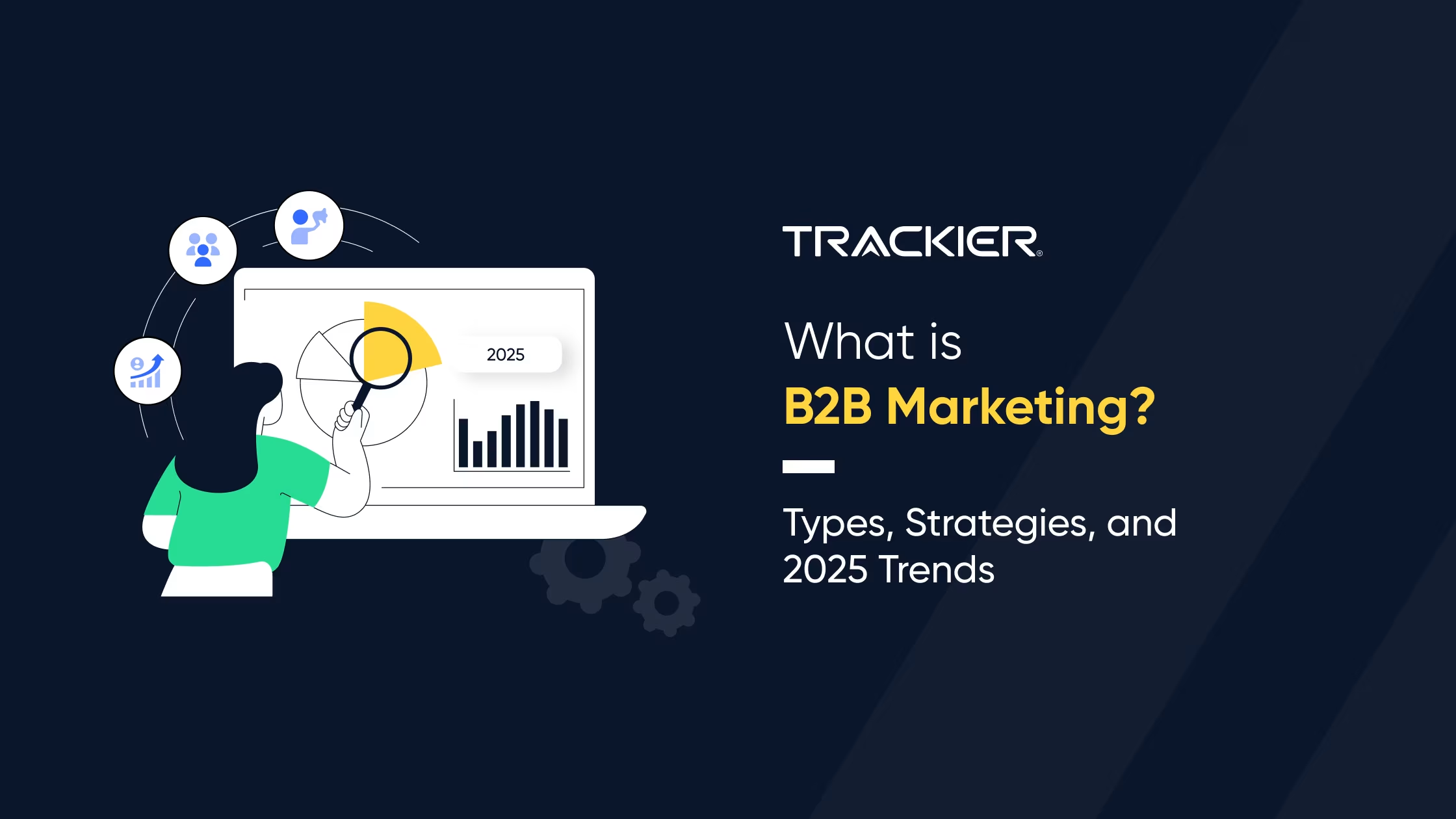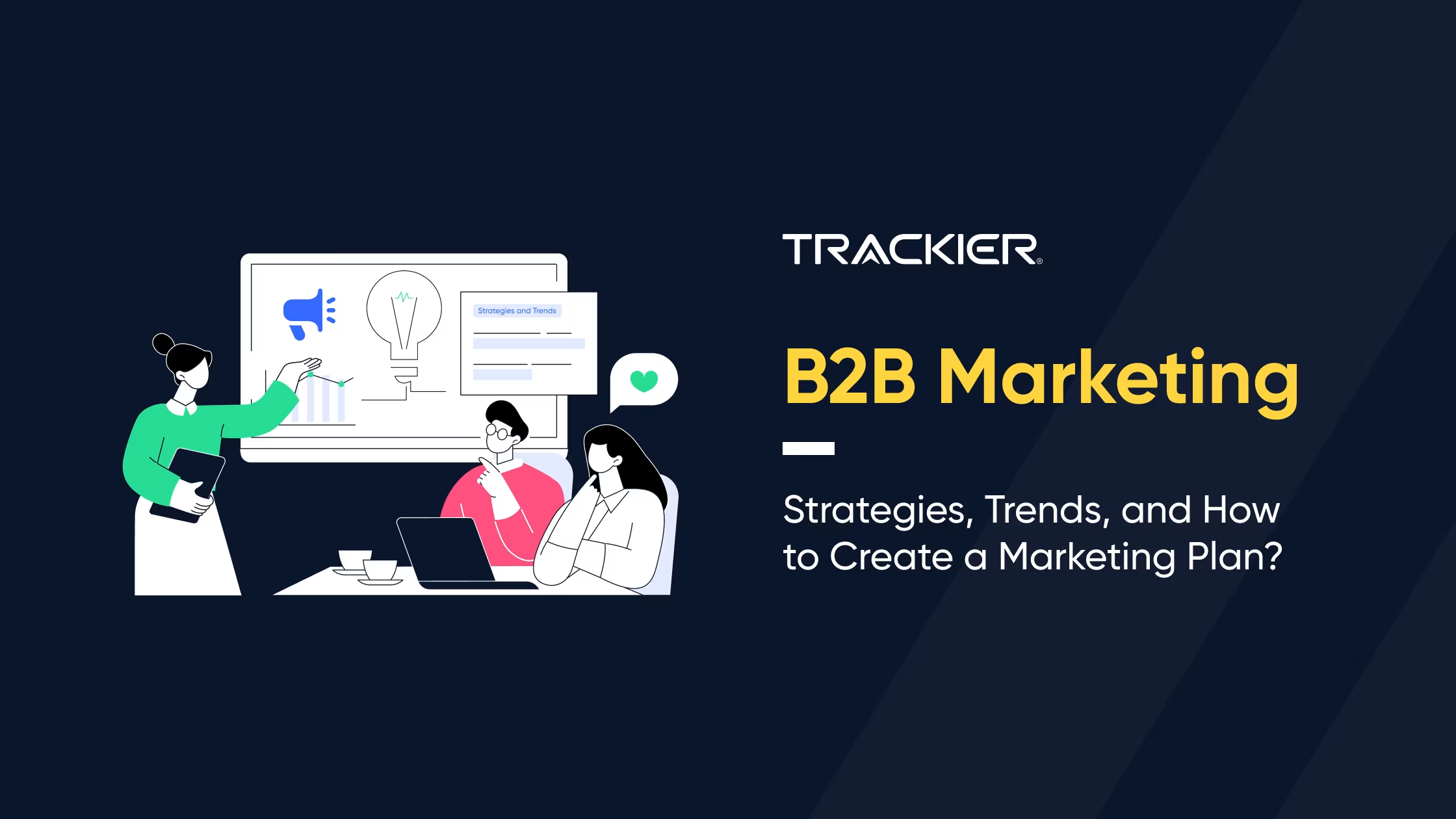B2B (business-to-business) marketing is about promoting products or services from one business to another and is more focused on value, trust, and building long-term relationships. Buying decisions in B2B are more complex and time-consuming.
In fact, 77% of B2B marketers are using content marketing to nurture leads, and it is now clear that the best marketing strategy is essential to achieve success. To track your marketing efforts, you can use Trackier, which provides comprehensive tracking, detailed analytics, and fraud prevention.
What is B2B Marketing?
B2B marketing is promoting the product or service from one business to another. Unlike B2C marketing (which targets individual customers), B2B marketing is more focused on fulfilling the needs, interests, and solving challenges.
Some key characteristics:
- Complex decision making – In B2B, a purchase decision has to be approved by many individuals, including procurement officers, department heads, and C-suite executives.
- Longer sales cycle – Due to higher investment and dependability of business success, B2B transactions have a longer cycle from 2 to 6 months.
- More focused towards relationships – To retain the client, building relationships is more crucial.
- Content should deliver value – To easily gain the trust of B2B customers, it is necessary to provide original and value-driven content that solves their challenges or provides deeper insights on industry trends.
How B2B Marketing Actually Works?
As we already know, B2B marketing is all about identifying business needs and providing them with value-driven solutions. Let’s understand how it works:
1. Identify Target Audience
Before actually doing B2B marketing, identify your target audience and pinpoint the specific industry, company size, and what are the roles of which people in the organization.
This clarity will help you to target a more personalized audience base depending on your market niche and the value that you are offering.
2. Create Value Proposition
It is essential to present how your products or services have solved a problem or improved any business’s efficiency. For example, you can showcase any highlight that saves cost or any productivity benefits that businesses have gained.
3. Create Educational Content
By providing valuable resources like whitepapers, case studies, and webinars, you can educate your readers along which also helps to establish trust and build authority.
4. Use Various Marketing Channels For Outreach
Use various marketing channels for outreach like email, social media, SEO, and paid advertising to ensure you get maximum reach and engagement for your B2B business.
5. Nurture Your Leads
Implement lead-nurturing campaigns via personalized email marketing and targeted content that helps to keep your prospects engaged throughout the sales funnel and helps them to convert.
6. Measure and Optimize Your Campaigns
It is necessary to measure and optimize your influencer marketing campaigns to help B2B businesses make data-driven decisions to improve ROI.
Track. Analyze. Improve with Trackier!Types of B2B Marketing Channels
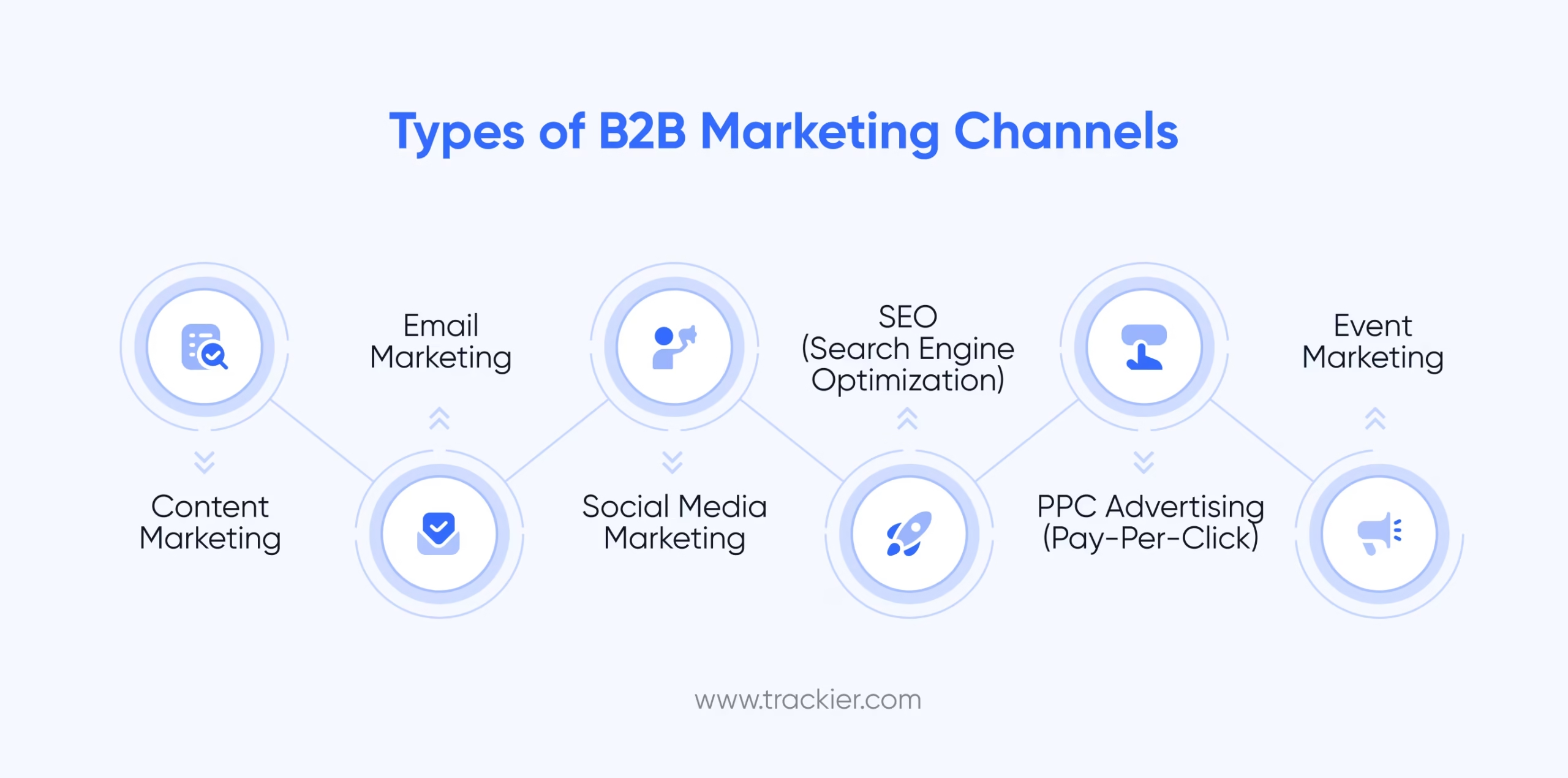
Effective B2B marketing uses both online and offline channels to engage the right audience. The goal is very simple, and that is to nurture trust, show value. The most impactful B2B marketing channels are:
1. Content Marketing
It should be informative, actionable, and well-structured that help your brand establish authority in your niche and educate potential customers. Some of the content types you can use:
- Blogs – It is necessary for SEO; if done right, then your blogs can even rank better on Google, which helps you to generate traffic and get maximum audience engagement. Blogs cover pain points of the target audience, industry trends, and you can even publish how-to guides.
- Whitepapers – It is a very effective type of content marketing in various niches where data, research, and insights are essential to make informed decisions.
- Case studies – This type of content helps to showcase how you have solved a real problem, and it can be anything from reducing efforts or utilizing marketing budget.
- E-books and guides – Providing free downloadable e-books and guides is an effective way to generate leads.
- Video content – Product demos, customer testimonials, and behind-the-scenes clips are the best for YouTube and LinkedIn.
2. Email Marketing
It is still the dominant marketing channel and is projected to grow to 4.89 billion users in 2027. You can keep engaging your customers with so many materials and even push your reader to buy the product (of course, if it is not your already customer). It includes:
- Newsletters – You can share your blog highlights, product updates, event invitations, and many more updates.
- Drip campaigns – It is an automated email sequence that helps your customer at every stage of the buyer’s journey.
- Cold outreach – If done right, it can open many new opportunities for your B2B business, especially in niche sectors like fintech, travel, or SaaS platforms for collaboration and making them a buyer.
3. Social Media Marketing
Social media platforms are mostly built for B2C brands (they run ads, and eventually their buyers buy it); however, some platforms are best for B2B audiences. Let’s understand one by one:
- LinkedIn – It is best for B2B brands who want to promote thought leadership, connect with decision makers, run targeted ads, and build brand credibility.
- X – One of the best platforms for real-time updates, trending discussions, and connecting with real journalists.
- YouTube – Has a huge amount of explainer videos, tutorials, and webinars that help to build credibility in your niche.
4. SEO (Search Engine Optimization)
SEO is one of the most cost-effective marketing strategies, whether it is B2B or B2C marketing. Key elements include:
- On-Page SEO – It includes optimizing title tags, headers, meta descriptions, primary keywords, and internal links.
- Technical SEO – Includes making page loader faster, mobile responsiveness, HTTPS, and structured data.
- Off-Page SEO – Getting mentions and links from high authority websites.
5. PPC Advertising (Pay-Per-Click)
PPC delivers immediate traffic and measurable ROI, which makes it one of the best channels for targeted B2B campaigns. Some of the key platforms are:
- Google Ads – You can target industry-specific and high-internet-search keywords.
- LinkedIn Ads – Best for B2B campaigns. However, it is a little bit costlier when compared to other platforms.
6. Event Marketing
This form of marketing helps to build real relations, establish brand authority, and generate qualified marketing leads. It includes:
- Trade shows and industry conferences – Participating in these events helps to engage directly with your potential partners, clients, and industry leaders.
- Networking events and roundtable discussions – Smaller and very curated events help to build deeper and one-on-one conversations with key stakeholders.
Difference Between B2B Marketing and B2C Marketing
Here are the differences between B2B and B2C marketing based on various aspects like target audience, content focus, decision process, and many more.
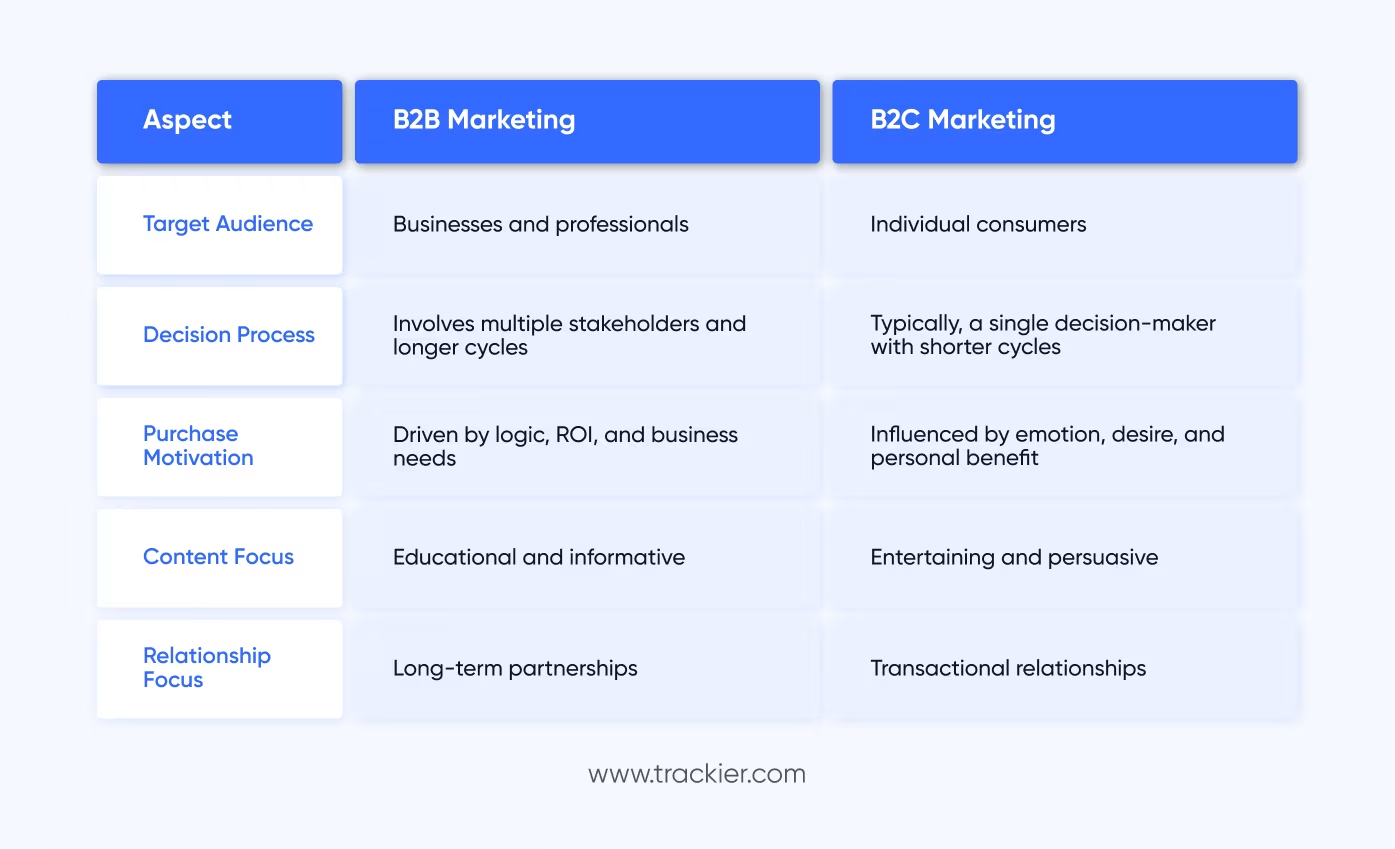
Top 7 B2B Marketing Strategies
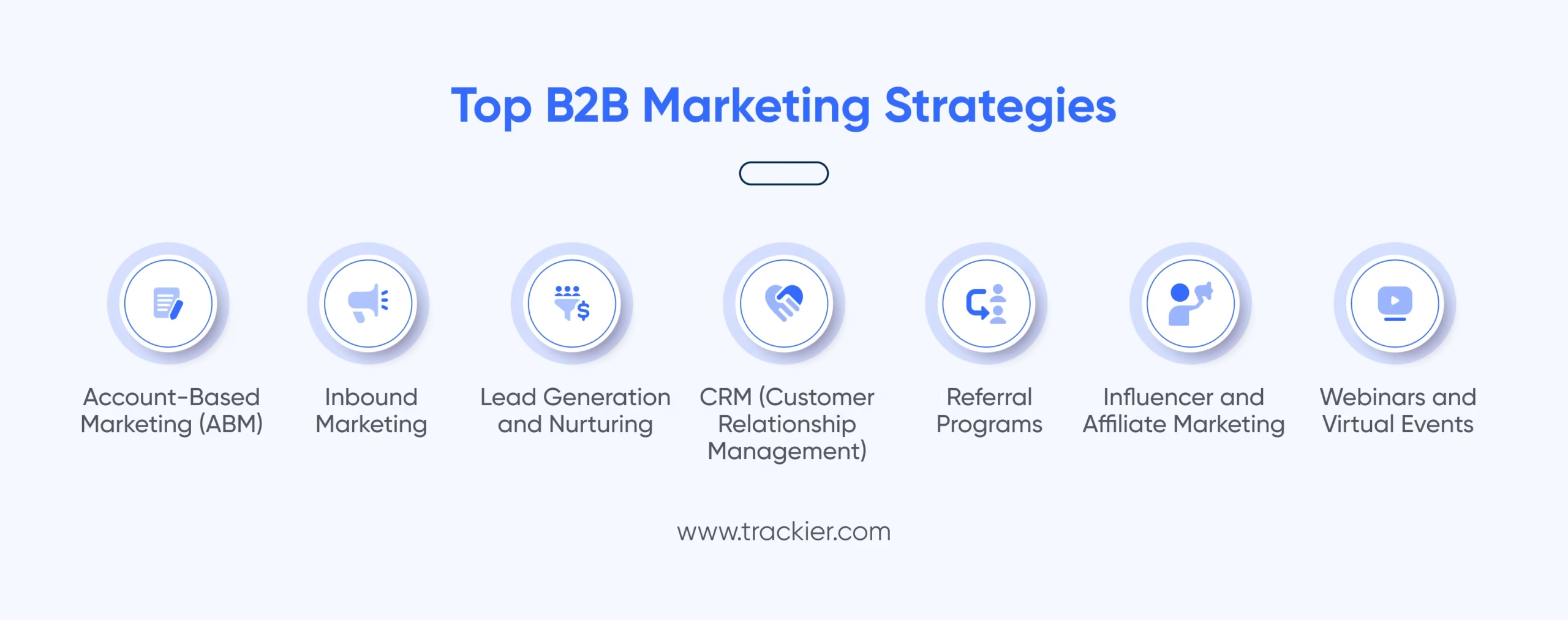
B2B businesses have to use the best marketing strategies to stand out in the market, and some of them are ABM, inbound marketing, and many more that have been covered in detail.
1. Account-Based Marketing (ABM)
It is a focused growth strategy where the marketing and sales teams collaborate with each other to create a more personalized buying experience for higher-value accounts.
Instead of focusing on a broader experience, ABM focuses on the most profitable accounts. Some of the key benefits are:
- Short sales cycle
- More personalized communication
- Better collaboration between the marketing and sales teams
- Improved ROI (Return on Investment) and CLV (Customer Lifetime Value)
2. Inbound Marketing
In this type of marketing strategy, brands provide real value to their customers to attract potential leads, and B2B businesses use content marketing, SEO, email campaigns, and social media to drive organic traffic while generating quality leads.
Many businesses also publish whitepapers, webinars, eBooks, and case studies to establish their authority and trust. Main elements of inbound marketing include:
- Building a content strategy based on audience profile, buyer personas, and intent.
- Using SEO to boost visibility.
- Creating lead magnets like free tools or downloadable guides.
3. Lead Generation and Nurturing
Lead generation is one of the primary goals of any B2B business. However, generating leads is just one thing, while nurturing them until they are ready to convert is a different thing. Effective lead generation strategies include:
- Provide original content.
- Host webinars and virtual events.
- Run PPC campaigns to target specific industries or audiences.
- Engage your prospect via LinkedIn and other B2B platforms.
Once your leads are in the pipeline, you have to nurture them by providing relevant information based on their behavior and where they are in the sales funnel. You can use various ways to automate this process, like using email automation software and dynamic landing pages.
Other than this, you can track all of your activities on the Trackier dashboard. You can track leads from the first click to conversion.
4. CRM (Customer Relationship Management)
A CRM system helps businesses to build and manage their customer relationships in the sales funnel. CRM software allows:
- Comprehensive tracking of all the interactions with prospects and customers.
- Provide insights into customer preferences and pain points.
- Can be integrated with email, social media, and analytics software.
5. Referral Programs
Referral programs encourage referrals from existing clients, partners, or affiliates that lead to highly qualified customers.
To scale your referral program, you can use Trackier to get comprehensive tracking, fraud prevention, a customizable dashboard, and automation features. Along with this, you can also identify your super affiliates and work closely with them to improve your ROI even more.
6. Influencer and Affiliate Marketing
To boost visibility and build credibility, B2B brands can collaborate with influencers, bloggers, and niche content creators. You can directly engage with their followers who are already engaging with their content.
But why do these strategies work?
- Helps to build trust via influencers
- Get high-quality leads
- Provide measurable results
7. Webinars and Virtual Events
To get most of the engagement, webinars and virtual events are the best strategy as this helps B2B brands to show thought leadership, educate prospects, and you can even directly answer their questions in person.
These events also help to nurture leads and build authority by showing product demos, industry panel discussions, or training sessions. And one of the main advantages you will get is behavioral data such as attendance rates, engagement rates, and questions asked.
B2B Marketing Trends in 2025
To be in the crowded market, which is continuously changing, you need to be updated with the latest trends in 2025. Here are some of the key trends:
1. AI Integration
AI is not just a trend; it has become an essential part of B2B marketing. Marketers are integrating AI tools to automate their day-to-day tasks, improve targeting, and get more detailed insights.
- Predictive analytics – AI helps businesses to forecast their customers’ future behaviors, so that marketers can improve their campaigns. By analysing historical behavior, AI tools can predict which customers are more likely to convert.
- AI Chatbots – They provide real-time support, answer customer queries instantly, and help to qualify leads even during off-business hours, which helps to reduce response time and increase engagement.
2. Video Marketing
Video marketing is still dominating digital marketing and even B2B marketing. With the help of video marketing, B2B can speed up the buying process of their potential customers. Some formats are:
- Explainer videos – It helps to break down complex products into more simpler version, and also gets higher engagement.
- Live streaming and webinars – B2B brands are heavily investing in these types of formats that offer educational value and even generate very high-quality leads.
- Short-form social videos – Even in B2B, short-form platforms such as YouTube shorts, Instagram reels, and LinkedIn videos drive more authentic engagement than any other platform.
3. Voice Search Optimization
As voice search assistants like Siri, Alexa, and Google Assistant are very common nowadays and optimizing your content for these assistants is essential.
- Natural language queries – Voice searches are more side of conversation. B2B marketers have to optimize their content for long-tail keywords and FAQs.
- Featured snippets – Structure your content to be featured in snippets for commonly asked queries to get maximum exposure.
- Local searches – Local searches are increasing continuously, and B2B brands can optimize them to appear at the top when people search for any service that they offer. However, for this, you need to set up your “Google My Business” account.
Conclusion
B2B marketing is all about creating real connections, providing value, producing original content, and using comprehensive data to make smarter decisions. B2B brands have to build trust in their niche as there is are longer sales cycle and the chance will increase of conversion increases if you build credibility.
Also, you have to use different marketing strategies such as ABM, influencer partnerships, and performance tracking to achieve success. At the end of the day, you need a performance marketing software to track all of your marketing activities, and for this, you can use Trackier to view every click, optimize campaigns in real-time, and prevent fraud to get better ROI.
FAQs
1. What is the difference between B2B marketing and B2C marketing?
B2B marketing focuses on building long-term relationships, more complex decision making, and value-driven collaboration. However, B2C marketing is more focused on the emotional side, faster response, and aimed at individuals who can directly purchase their product.
2. Why is content marketing more important in B2B?
Content marketing helps to educate your prospects, build trust, and help them in how your product or service actually solves their challenges.
3. Are webinars still effective for B2B in 2025?
Yes, webinars are one of the most engaging ways to educate your prospects, build authority, and get qualified leads.
